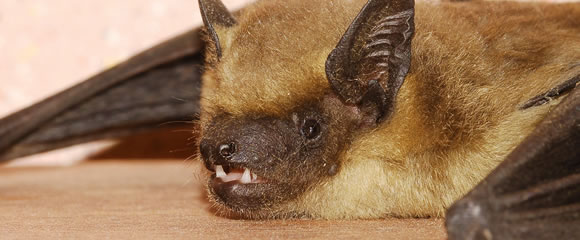
Bat removal in New Jersey is a very common call that most wildlife removal operators will deal with in the summer months, Bats are colonized animals meaning they will spend the summer months in colonies. Some colonies in New Jersey have been known to exceed over 1000 bats in a single colony!
In New Jersey Bats will mostly be found in the attics of homes and buildings, bats will seek the warmth of a attic in the early part of the spring, because this offers a really nice ventilated place for the female bat to have her babies. Bats are Mammals, meaning they lactate, just like other animals, They have very limited fur and a mother bat cannot keep the baby bat warm, that is what they use the attic space in your home for, The attic space in your home acts as a incubator for the baby bats. Attics are very warm dry places, exactly the climate the female bat will need to raise her baby!
I have Bats in my Attic, Now what?
Bats in the attic are very common; in fact more people in New Jersey have bats in their attic than actually realize they have them. It is estimated that one in every 10 house has bats in many parts of New Jersey. The number was higher several years ago, however a disease call white nose has thinned the bat population over the last several years.
The best way to deal with a bat in the attic problem is to have a professional wildlife removal company deal with it. Bats can be very difficult to treat and since they are a protected species by the New Jersey Division of fish and Wildlife only experienced operators will all the correct permits issued by the state should attempt to exclude bats from the attic of a home.
Why Should I pay a professional for Bat Removal?
There are several reason that you should have a professional bat removal company do the bat exclusion on your home, The most important reason is that as mentioned above, bats are a protected species in New Jersey and if any action is taken against a bat colony that ultimately destroys the colony, You the homeowner could face civil and criminal penalties by the State of New Jersey.
These animals are one of the most Beneficial animals in America, They kill hundreds of tons of insects and misquotes each and every year. Another reason to have this work done by a professional bat removal company is safely removing all bats and bat guano. This is done after a bat exclusion is done. Removing the bat guano involves the use of some specialized vacuums and other equipment that only knowledgeable bat removal companies will have. After all the contaminated insulation has been removed, the entire attic should be disinfected to prevent airborne funguses from entering you home.
There are several steps that need to be done very carefully or you will completely contaminate your living space. HAVE A PROFESSIONAL DO THIS!!
There are several diseases associated with bats and bats in your attic including Histoplasmosis, Cryptococcosis, and Rabies.
Histoplasmosis
Histoplasmosis is caused by a fungus (Histoplasma capsulatum) found primarily in the areas around the eastern seaboard. Both humans and animals can be affected by this fungus. The disease is transmitted to humans by airborne fungus spores from soil contaminated by pigeon and starling droppings (as well as from the droppings of other birds and bats). The soil under a roost usually has to have been enriched by droppings for two years or more for the disease organism to reach significant levels. Although almost always associated with soil, the fungus has been found in droppings (particularly from bats) alone, such as in an attic. This can be stirred up, when someone carelessly get into an attic and disturbs the piles of bat guano. Never remove guano from a attic without the proper equipment.
Cryptococcosis
Pigeon droppings appear to be the most important source of the disease fungus Cryptococcus neoformans in the environment, it is also thought that bats can contribute to this fungus.. The fungus is typically found in accumulations of droppings around roosting and nesting sites, for example, attics, cupolas, ledges and water towers. It has been found in as many as 84 percent of samples taken from old roosts in New Jersey are active for the fungus. Even when very old and dry, bird and bat droppings can be a significant source of infection.
Rabies
Rabies is a disease caused by a virus and it is almost always fatal. It is spread through a bite by an infected animal. Although rare, it can be spread through infected saliva getting into an open wound of humans. This is rare in New Jersey. But bats can and will spread this disease.
We are the professionals in the new Jersey area, we have been doing wildlife removal in this area for over 20 years. Give us a call to receive your in home inspection today!
Some of the places and services we offer are:
Newark Bat Removal
Bridgewater Bat Removal
Clifton Bat Removal
East Orange Bat Removal
Edison Bat Removal
Elizabeth Bat Removal
Franklin Bat Removal
Freehold Bat Removal
Jersey City Bat Removal
Manchester Bat Removal
Middletown Bat Removal
Millburn Bat Removal
Montgomery Bat Removal
New Brunswick Bat Removal
Newark Bat Removal
Paramus Bat Removal
Passaic Bat Removal
Patterson Bat Removal
Plainfield Bat Removal
Trenton Bat Removal
Westfield Bat Removal